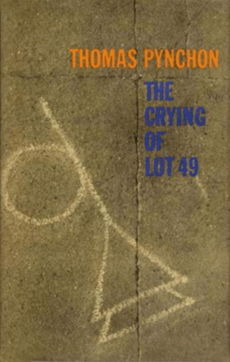Does Pynchon’s novel mean something or am I crazy?
 The heroine, Oedipa Maas, has a similar question. A former lover, Pierce Inverarity named her the executor of his considerable estate. Rather than bequeathing her money or property, he has saddled her with a long, legal process that she does not understand. As she is not a lawyer and has had little contact with Inverarity for many years, the naming of her Executor is puzzling. Was Inverarity trying to tell her something, or was it just one of his bizarre whims? Was he playing a practical joke on her, or was he hinting at a secret society?
The heroine, Oedipa Maas, has a similar question. A former lover, Pierce Inverarity named her the executor of his considerable estate. Rather than bequeathing her money or property, he has saddled her with a long, legal process that she does not understand. As she is not a lawyer and has had little contact with Inverarity for many years, the naming of her Executor is puzzling. Was Inverarity trying to tell her something, or was it just one of his bizarre whims? Was he playing a practical joke on her, or was he hinting at a secret society?
And what about those strange names — Oedipa Maas and Pierce Inverarity? They are too odd to pass over. Pynchon obviously wants us to notice them. Oedipa is the feminine version of the Oedipus of Greek legend, more specifically of the Oedipus complex described by Freud, in which the son wants to kill the father and marry his mother.
Except Oedipa is a woman. Does Oedipa want to kill her mother and marry her father? We don’t hear much about her parents. There is a female counterpart to the Oedipus Complex, but the Electra Complex is not as well known. The Freudian subtext here will not let us overlook the name “Pierce,” especially for a former lover. But what about “Inverarity”? At first look, it means “not veritas,” or “not truth,” so his name means “to pierce the lie.” In which case, Inverarity is leading her to a secret truth, a conspiracy. Maybe his surname means “no variety,” so his full name could be interpreted as “resist conformity.” The last name could refer to “inveterate” as well, describing a person with bad habits that are so ingrained they can not or will not stop. Inverarity did have some strange habits, but does the “Pierce” means he wanted to break them? How? By dying? The question is: do the names mean anything or is Pynchon just playing with us? Is there intent behind the names or are they just distractions? This is our central question: do things have meaning or are we just over interpreting the noise?
 Throughout the novel we have to think about communication. How is it happening and what is the message, if any? As Oedipa is examining rare stamps in Inveriarity’s collection, she finds the symbol of looped horn with a mute. She learns the looped horn was the symbol of an early postal service. The German family Thurn and Taxis began delivering mail in an organized fashion in the 16th century. But why the mute? She learns that there may be a shadowy postal service that has opposed the official mail system for more than four hundred years, the Tristero. The mute is because they want to silence the official mode of communication.
Throughout the novel we have to think about communication. How is it happening and what is the message, if any? As Oedipa is examining rare stamps in Inveriarity’s collection, she finds the symbol of looped horn with a mute. She learns the looped horn was the symbol of an early postal service. The German family Thurn and Taxis began delivering mail in an organized fashion in the 16th century. But why the mute? She learns that there may be a shadowy postal service that has opposed the official mail system for more than four hundred years, the Tristero. The mute is because they want to silence the official mode of communication.
Oedipa begins to notice referents to the organization everywhere. One very long, delusional night in San Francisco, she sees the symbol everywhere and finally follows someone to a waste paper box under the freeway. The acronym, “W.A.S.T.E.” is written along side the postal horn. (Later she learns that this stands for, “We Await Silent Tristero’s Example.” She sees people drop off letters. The only way to mail the letters is apparently to throw them away. Silence exists on both sides. Either the letters disappear in the city disposal system or they are picked up by “silent Tristero.” Eventually an old wino picks up the letters carries them across town and switches bags with another carrier in Civic Center.
Or is she just paranoid? Maybe the old man was just savaging in the trash. To find out, she goes to her psychiatrist. Unfortunately, Dr. Hilarius (what a name!) has flipped his top and is shooting at people. He thinks the Jews are coming to get him. Oedipa calms him enough to talk to him and he confesses that he had worked in a concentration camp, conducting psychiatric experiments to drive inmates insane in order to study identity. However, he swears he repented, which is why he chose Freud over Jung, the Jew over the Austrian.
But he has lost his faith in Freud. If Freud was right then all the concentration camps would have turned into fields of flowers with a bit of treatment. Tell a story, and poof! the nightmare goes away. Freud believed in a narrative cure, the healing of trauma through the telling of story. Only it doesn’t work. Dr. Hilarius has realized that bad things do not go away so easily, just by talking about them. Oedipa manages to get the gun away from him. She leaves the clinic walks without knowing the answer of whether or not she is crazy. And Dr. Hilarius? Was he paranoid or were the Jews really catching up with him?
After more bizarre adventures, she finds no definite answer. The book ends anti-climatically without resolution. In the final pages, Oedipa takes apart the dilemma: there was either “[a]nother mode of meaning behind the obvious, or none . . . Either Oedipa in the orbiting ecstasy of a true paranoia, or a real Tristero. For there either was some Tristero beyond the appearance of the legacy America, or there was just America and if there was just America then it seemed the only was she could continue, and manage to be at all relevant to it, was as an alien, unfurrowed, assumed full circle into some paranoia” (Pynchon 150 – 151).
The ending of this line gets tricky. First of all, what’s up with the “was” in “the only was she could continue? My friend Ian’s edition, which is older, has the word “way” sensibly in place, “the only way she should continue.” My friend Katie’s edition, a reprint of mine, has the same mistake. Our editions are both more recent than Ian’s, so maybe the mistake was deliberately put in or reinstated from an early version, meaning “the only past form of being she could manage.” Or maybe it was just a mistake.
Either way, the ending of the line is odd. When we read “was as an alien, unfurrowed –,” we may not know what “unfurrowed” means, but we expect a noun, like “person” or “being” or even “paranoic.” Instead the line wanders out of convention syntax: “an alien, unfurrowed, assumed full circle into some paranoia.” Does the odd twist at the end mean anything or was it just sloppy writing?
And what does the novel mean, if anything? Either it makes sense, although no questions are resolved, or it doesn’t. In this regard, the book is no different than life. For either the world makes some kind of sense, or we are crazy to try to make sense of it: “Behind the hieroglyphic streets there would either be a transcendent meaning, or only the earth” (Pynchon 150). What does Pynchon think? He leaves the book open-ended, but the very act of writing implies that meaning can be found. In The Crying of Lot 49, the question of whether or not there is meaning, though unresolved, is the meaning of the book. In other words, Pynchon must believe in the conspiracy of the secret message. If not, why write at all?
I tend to think we are crazy, as crazy as Don Quixote, who thought he could make sense of the world through chivalry. We all have different answers for the world — Mormonism, Marxism, Perverse Polymorphism, Taoism, the Tristero — but we are seeing narratives where there is nothing but noise, a great deal of sound and fury, signifying nothing. We make the meaning, but the meaning exists because we made it. Therefore, to the question message or madness, I answer, both! Madness makes the message, and the message, although insane, is how we make sense of a senseless world.
Pynchon, Thomas. The Crying of Lot 49. New York: Harper Perennial, 1965. Print.